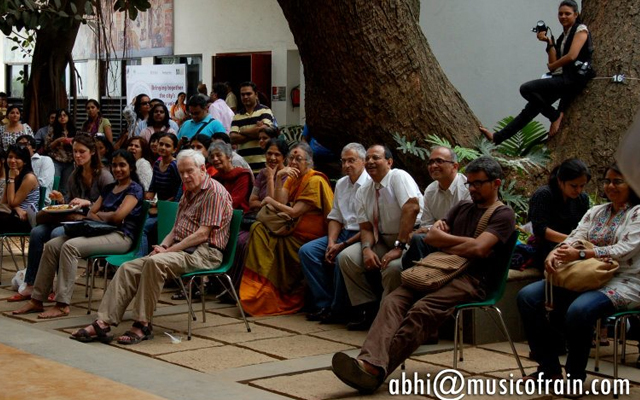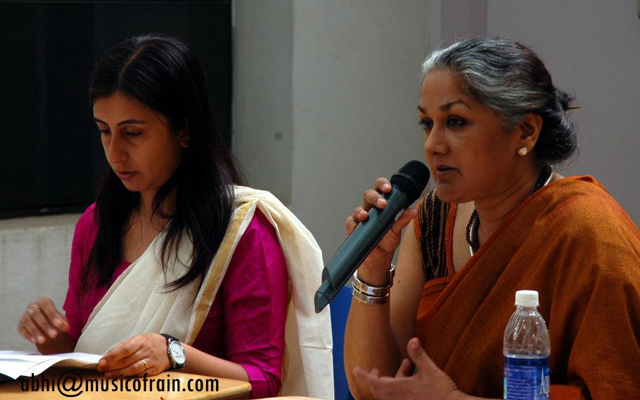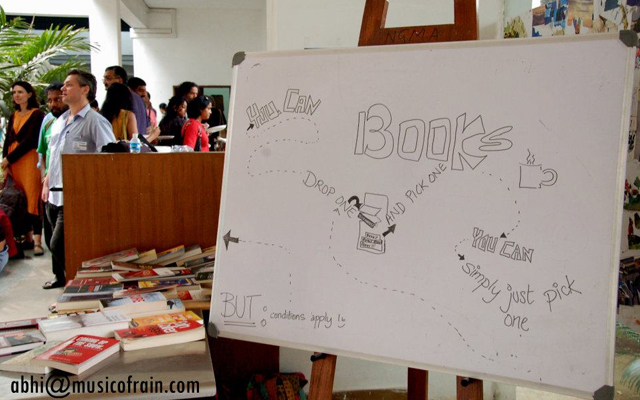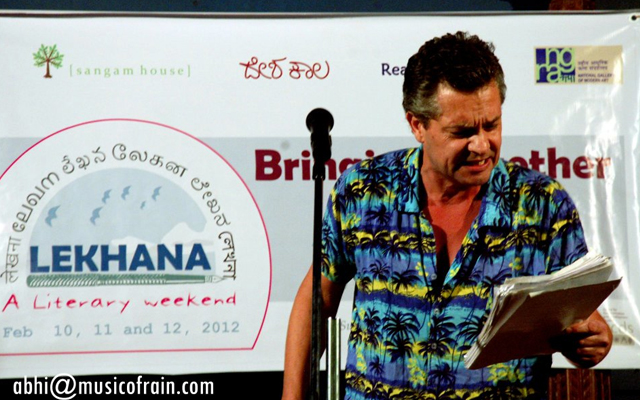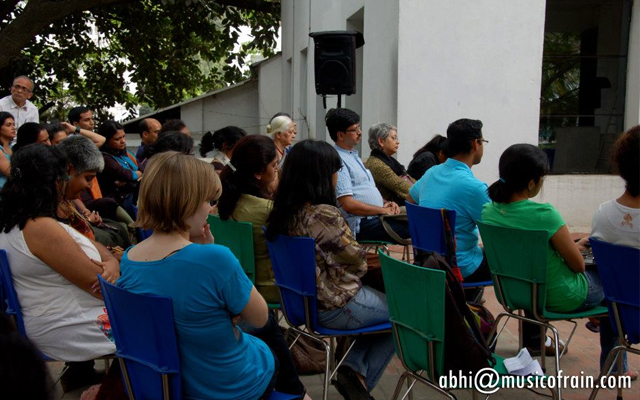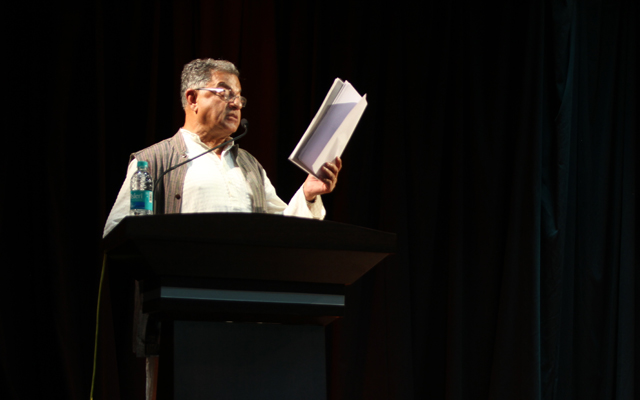Sangam House, Toto Funds the Arts, Desha Kaala and Reading Hour came together to organise a literary weekend in Bangalore. The city’s literary riches had yet to be show-cased in a single multi-lingual event and so, over a three-day period of readings, discussions and small performances, Lekhana brought together writers in the city’s many languages as well as their pluralistic audiences. All sessions were free and open to all.
The National Gallery of Modern Art (NGMA), which is housed in Manikyavelu Mansion, a refurbished heritage building, was the primary venue for the literary sessions.
Lekhana is committed to bringing together the diverse literary worlds that the city holds within itself, worlds that rarely have a chance to interact with each other, to speak to or listen to other.
Panel Discussions
Friday 10 Feb, 5.30pm
The City In Lterature — Mk Raghavendra
Anjum Hasan, Zac O’yeah, Kr Usha, Saniya
The panel will discuss the representation of Bangalore in literature and the arts, whether the city has a character which sets it apart from the other cities in India. What it has meant to those who have lived in it or those dependent on it? Various categories of residents – not only classified according to the lengths of their stay here and the economic classes to which they belong but also to the different parts of the city to which they owe allegiance – may have responded to the city in different ways. Do the arts also tell us anything about it and about their relationship with one another? Another issue that could be interesting is whether perceptions of the city – as reflected in various texts – have, conversely, influenced the way the city has transformed over time.
Saturday 11 Feb, 10.00am
Translations As Conversations — Giriraj Kiradoo
Lakshmi Holmstrom, Rahul Soni, Arshia Sattar, Vanamala
Apart from giving us access to texts that are far away from us in space and time, what else do translations accomplish? Do translations enable us to start conversation with each other as we read each other’s works? Do we discover our differences or our similarities in these conversations? Is English becoming the link language of and for Indian literatures?
Translations are conversations, almost by default: any act of translation has to be some kind of conversation between two or more individuals, texts, languages, societies, cultures and sometimes, nations. It acquires a completely different significance in a (post)-colonial context just as it always does when the target language is ‘dominant’ in more than one ways. We wish to explore the politics of self that colors a translative conversation, the state of ‘creative’ bilingualism in India and the identity of a translator. We also wish to discuss the decreasing interest in translations across ‘indigenous’ languages.
Saturday 11 Feb, 12.00pm
Writing About Writing — Anjum Hasan
Rahul Soni, Vivek Shanbag, Samhita Arni, Sumana Mukherjee
We are trained in literature and we teach it; we are die hard book lovers; we are familiar with literature in more than one language; we read in multiple languages and in translation; we translate ourselves and the work of other writers; we write in more than one language; we run journals and edit other people’s writing. Everyone on this panel has a rich and complex relationship to literature—strands of the web inevitably crisscrossing and overlapping with the other. I would like to bring all these various strands to focus on one question: how do we write about writing? Or how do we write about writing in India in 2012 given the opportunities (more books being published than ever before, for instance) and challenges (limited review space, for instance). We will talk about strategies for book reviewing; our favourite critics; how we have tried to create platforms for critical writing; where we feel critical writing in English/Kannada/Hindi might be lacking; and why we write about writing.
Saturday 11 Feb, 2.30pm
The Culture Elephant– Naresh Narasimhan And S Diwakar
The presentation asks the audience to reflect on the various sources and dynamics of the cultural form that characterise the city of Bangalore. Arguing that the form and experience of culture as necessarily multiple and shaped by one’s mode of social participation, the presentation goes on to explore how cities can be designed to promote occupying of urban spaces for varied and inter-connected cultural expressions. Instead of focusing on a certain elite ‘Creative Class’ within the city who acts as the cultural and economic vanguard, the presentation champions a more broad-based approach to create urban opportunities for diverse intercultural encounters.
Saturday 11 Feb, 4.15pm
New Writing In Kannada — Vivek Shanbag
Jayant Kaikini, Raghunath, Ms Asha Devi, Sr Vijayashankara
There is an abundance of new writers in Kannada and they come from different social backgrounds, have varied educational qualification and pursue different professions. The diversity of experiences being brought into Kannada literature will be the focus of this panel. At a period in time when publishing opportunities are plenty, it is important to consider what rigour or training is required for a new writer to be of a certain caliber. Also to examine if these writings have the language to capture new experiences. The panelists include critics, editors and writers who have engaged themselves with New Writing in Kannada and understand the importance of nurturing new talent.
Sunday 12 Feb 10.00am
The Joys Of Short Fiction — Jahnavi Barua
Kr Usha, Shinie Anthony, Indira Chandrasekhar, Arun Kumar
In this discussion, various aspects of the short story will be discussed such as the scope of the short story, the crafting of one, the difficulties of publishing short fiction and on a lighter note, the panellists will share with the audience their own personal favourite short stories and authors. The short story is a powerful and, thus surprisingly, neglected genre in fiction. There have been periods of time in history when it has achieved a certain prominence or when it has been fashionable, but it suffers today in the shadow of its mightier cousin, the novel. Yet, to write a short story or to read a good one is to understand how deceptively simple this craft is and what skill is demanded of the writer. And the intense, enduring pleasure that a good short story brings to the reader is difficult to replicate. Through this discussion, the panellists take the audience on an exploration of the enigmatic world of the short fiction, hoping, in the end, to ignite freshly the many, subtle delights of the short story.
Sunday 12 Feb, 12.00pm
The Word And The Image — Sanjay Iyer
Christoph Storz, Jaideep Sen, Annapurna Garimella
The panel concerns itself with the encounters, dialogues, and mutual collaboration (or hostility) between verbal and visual languages. It reflects upon the relations between words and images from a variety of perspectives, both theoretical and practical. The panel will explore the relationship between the literary and the visual, within a larger sense of the arts, philosophy, and literature. How do verbal and non-verbal forms of expression ‘speak’ to each other? Do they have troubled contact? Are they isolated because of their essential incompatibilities? Or have they had a symbiotic co-existence, words and images collectively making for us a cultural map, and a cultural future? Panellists, equally drawn from the world of the image and that of the word, will perhaps strengthen the grounds for meaningful ‘discourse’ among larger publics.
Sunday 12 Feb, 2.30pm
What Stops Us From Saying What We Want To Say — Ashish Rajadhyaksha
Sushma Veerappa, Kaiwan Mehta, Ashutosh Potdar
Increasingly, as we move into new definitions of State and new social structures, there are growing concerns around what some have called too much freedom, or what others see as valued 20th century social rights running rampant. Even as we face, and do battle to, orthodox restrictions on free expression by the State on say social networking sites, we have also begun noting the downside of unrestricted freedoms, for example in the explosion of media practices that have dropped many professional standards of responsible reportage. There has been a growing sense that, if we don’t want draconian state measures, it is better to have self-imposed restrictions, and develop, as it were, a personal model code of conduct, rather than have someone else impose any such code upon us. Several new-generation social and cultural rights are getting premised on assumptions that the State may not always be the best agency to deliver, or even ensure, that such rights are enforced in everyday life. So what does personal self-restriction mean in this kind of situation? What else, apart from a draconian state, stops us from saying what we want? Are we placing an ever-growing set of restrictions upon our own practice for fear that, if we don’t, the state will?
Sunday 12 Feb, 4.15pm
Body And Biography — Ammu Joseph
Girish Karnad, Joshua Muyiwa, Kutti Revathi, Mamta Sagar
The controversy over some Tamil women writers’ poems not so long ago (which followed a similar furore about Telugu women writers’ poems some years earlier) suggests that there is still some discomfort in certain quarters about women taking on sexual politics in their writing. And, traditionally, few women writers – including senior, well-known literateurs – have written autobiographies. Yet the recent publication of some autobiographies, some by women, that do deal with bodies and sexuality suggests a shift of sorts. Or does it? The Lekhana session titled Body & Biography aims to explore what is going on in this area today, through the experiences and observations of writers themselves.
Readings And Performances
February 10
05.00 pm: Inaugural reading by Gopalakrishna Pai, Khaleel-Ur-Rehman
05.15 pm: Recitations – City Poems
07.30 pm: Five Grains of Sugar (Performance, Auditorium)
February 11
10.30 am: Jayant Kaikini, Arathi HN (Kannada, Library Terrace)
11.00 am: Francesca Marciano, Douna Loup (English/French, Lawn)
11.30 am: Trivial Disasters (Performance, Courtyard)
12.00 pm: KVK Murthy, Usha Rajagopalan, KR Usha (English, Lawn)
12.30 pm: Arundhati Ghosh, Abhishek Majumdar (Bangla/Hindi, Terrace)
01.00 pm: Vasudhendra, Nagraj Vastharey (Kannada, Lawn)
02.00 am: Trivial Disasters (Performance, Courtyard)
02.30 pm: Joshua Muyiwa, Deepika Arwind (English, Terrace)
03.00 pm: Christopher Kloeble, Anna Bro (German/Danish, Lawn)
03.30 pm: Anjum Hasan, Indira Chandrasekhar (English, Terrace)
04.00 pm: HL Pushpa, Mounesh Badiger (Kannada, Lawn)
04.30 pm: Samhita Arni, Jahnavi Barua (English, Terrace)
05.00 pm: Saniya, Ashutosh Potdar, Milind Bokil (Marathi, Lawn)
05.30 pm: New Voices (at Smriti Nandan)
06.00 pm: Poetry Performance by Claus Ankersen (at Smriti Nandan)
February 12
10.30 am: Brigi, Sushma Kumar (Malayalam, Terrace)
11.00 am: VM Manjunath, VR Carpentor (Kannada, Lawn)
11.30 am: Trivial Disasters (Performance, Courtyard)
12.00 pm: Lotte Thrane , Anja Snellman (Danish/Finnish, Lawn)
12.30 pm: Lakshmi Holmstrom, Kutti Revathi, N Sukumaran (Tamil, Terrace)
02.00 pm: Shridevi Kalasada (Kannada, Lawn)
02.00 pm: Trivial Disasters (Performance, Smriti Nandan)
02.30 pm onwards: Play Readings (at Smriti Nandan) :Christopher Kloeble, Eugene Lee, Anna Bro, Ramneek Singh, Poile Sengupta
02.30 pm: Giriraj Kiradoo, Sandeep Shikhar, Rahul Soni (Hindi, Terrace)
03.00 pm: Mudnakudu Chinnaswamy, Chintamani Kodlekere (Kannada, Lawn)
03.30 pm: Zac O’Yeah, Dominic Franks, Gaurav Monga (English, Terrace)
06.00 pm: Girish Karnad reads from his memoir (Closing Session)
Lekhana was supported by Tally Solutions, the Sahitya Akademi and the Centre for Communication and Development Studies, Pune


